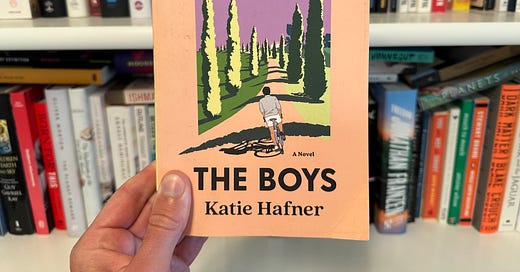My pet peeve is bad writing in big, expensive projects: blockbuster movies with dumb scripts, lame copy on major websites, and corporate blogs that publish nothing but hot air.
Better writing is the cheapest way to increase your project's leverage, and is differentiating precisely because it's surprisingly rare.
And now, a book I love that you might too:
The Boys by Katie Hafner executes the best plot twist I've experienced in a long time. It's only 250 pages, so I’m not going to tell you any more about the book, and don't look it up, just go read it and then email me when you get to the twist. Don't worry, you'll know when you get there.
Things worth sharing:
Jurassic Park inspired more people to go into biotech than any academic paper. The Matrix inspired more people to go into computer science than any GitHub repo. The Martian inspired more people to go into aerospace engineering than any industry trend report. Science fiction doesn’t predict the future, it does something much more interesting: tell stories about technology so compelling that people dedicate their lives to advancing the frontier.
If a passage from Foundry is going to do the internet rounds, I'm glad it’s this one.
Per this beautiful passage in Martin MacInnes’s In Ascension, don’t forget that you are literally made up of 37 trillion seawater balloons: “The cell is basically an ocean capsule. A preserved primordial capsule, holding the original marine environment inside. This is… this is just beyond incredible, isn't it? I mean, you could describe us as both people, and as mobile assemblages of ocean. I am not ready to get over this.”
The right advice for one situation is often the wrong advice for another situation, so the world is full of contradictory advice, all of which is good in different circumstances. The hard part is choosing what advice to apply to your particular situation, and my best advice is to choose the most interesting option, because even if it turns out to be wrong, at least it’ll make a good story.
Tim Ferriss on the danger of getting stuck at a local maximum: “If you only stick with what has worked, you might miss something that works a whole lot better.”
If you need a good laugh, I highly recommend Booksmart.
The point-and-click adventure game I’d love to make is all story and exploration, no puzzles. Playing the classics like Monkey Island and King’s Quest, I always wanted to just skip the puzzles so I could find out what happened next.
The best way to read more good books is to quit bad books as fast as possible.
Rick Liebling, a subscriber to this humble newsletter, interviewed me about writing Veil: “So much of my life would be unrecognizable to my great-grandparents, and yet, so much of it would be all too recognizable to them: friendships, family, work, politics, love, grief, joy, pain, generosity, humor, adversity, and brief, unexpected transcendence. These are what stories are made of: the timely and the timeless, the specific and the universal, the imagined and the barely imaginable all mashed up into words that make you feel things.”
Thanks for reading. We all find our next favorite book because someone we trust recommends it. So when you fall in love with a story, tell your friends. Culture is a collective project in which we all have a stake and a voice.
Best, Eliot
Eliot Peper is the author of Foundry, Reap3r, Veil, Breach, Borderless, Bandwidth, Neon Fever Dream, Cumulus, Exit Strategy, Power Play, and Version 1.0. He also consults on special projects.
“One of my favorite things about Peper’s writing is that Eliot does not believe that more is better. He writes enough to tell a great story. Sometimes I buy books that are 400-500 pages long and they intimidate me before I even turn the first page. Peper’s books are always the perfect length, and often more well-developed than some of the ‘more is better’ crowd. Foundry, coming in at 229 pages, with very short chapters, would be a perfect book for a week at the beach.”
-Pete Herr




